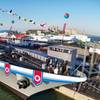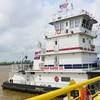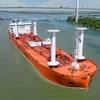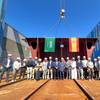Titan Petrochemicals Completes Shipbuilding Transaction
Part of the shipyard project – including the high-margin ship repair facility -is still at the development stage, however, which means the acquisition is not without risks. Acknowledging these risks, the payment has been structured to account for the fact that a lot of the earnings potential is based on what comes on stream in 2008-2010.
Hong Kong-listed Titan is paying a total of $170m for 100% of the Titan Quanzhou Shipyard, which is located in Fujian province. $57m of the total will be paid in cash, while the remaining $113m will be settled through the issuance of new shares to the seller, Titan chairman and controlling shareholder Tsoi Tin Chun.
About one quarter of the shares, or $28.6m worth, will be issued in the form of preferred shares that will be converted into ordinary shares subject to a three-year earn-out arrangement. The implication of this is that the shipyard must post pretax earnings of at least $7.5 million in 2008, $20 million in 2009, and $50 million in 2010 for Tsoi to get his final shares. If these thresholds are met, Tsoi’s stake in Titan will increase to 60.9% from 50.8% prior to this deal. The acquisition, which is subject to independent shareholder approval, is expected to be completed in October. Quanzhou Shipyard, which started operations in 2006 and launched its first ship last month, has an order book of 22 vessels with a combined order value of $210 million, which should ensure the earnings targets are met. On top of this, the ship repair and offshore engineering portions of the yard, which are both still under construction, are expected to be fully operational by the end of 2009. When completed, the yard will have an annual shipbuilding capacity of 26 tankers, a repair capacity of up to 250 vessels per year as well as offshore engineering capabilities such as the building of oil platforms. The company told investors at a presentation yesterday that the transaction is expected to be earnings per share accretive from 2009 onwards. Based on the earn-out targets and the $170 million acquisition price, Titan would have paid the equivalent of 22.7 times 2008 earnings, 8.5 times 2009 earnings and 3.4 times the expected earnings for 2010. This compares with a other Chinese shipyards that trade at forward PE multiples of 25-40 times. “We believe now is the right time to bring Titan Quanzhou Shipyard into the group’s business portfolio. The yard is developing very rapidly and its design features will allow it to benefit from the favourable and robust market environment,” Titan’s chief executive, Barry Cheung, said in a written statement. Titan has been gradually been moving away from its original business of transporting oil on very large crude carriers (VLCC) over the past few years and have been putting more focus on other parts of its business, including its oil storage facilities. The shipyard acquisition will reduce the Ebitda contribution from the VLCC business, which still has eight carriers in operation, to only 19% in 2010 from about 55% this year and 85% in 2004. The shipyard business is projected to account for 36% of Ebitda by 2010. In this sense the transaction will be a transformational event for the company. It also shows that this is different from the typical asset injection from a Chinese parent to its Hong Kong-listed vehicle that the market has grown used to when it comes to the telecom operators or the power generators since those typically involves more of the same types of assets that the listco already owns. Merrill Lynch advised Titan on the acquisition and CIMB-GK has been appointed as an independent financial adviser to the independent board committee. Titan’s oil storage business in China got the nod from Warburg Pincus earlier this year when the private equity firm bought a 49.9% stake in this business for $100 million. The two-part deal, which was engineered to give Titan a much needed cash infusion, also saw Warburg Pincus inject $75 million directly into the listed company in return for a 9.9% equity stake as well as preference shares and warrants that could increase its holdings to 22%. In July, Warburg Pincus sold its ordinary shares, however, and is now invested in the company solely through its convertible preference shares. After this transaction Warburg Pincus will hold 10.9% of Titan on a fully diluted basis if it converts all its shares and warrants, a statement to the stock exchange shows. Meanwhile, Titan also released its first half earnings yesterday, which showed a 19% rise in revenues from the year earlier period to HK$7.69 billion ($985 million). Net profit rose 132% to HK$152 million. Source: FinanceAsia.com














